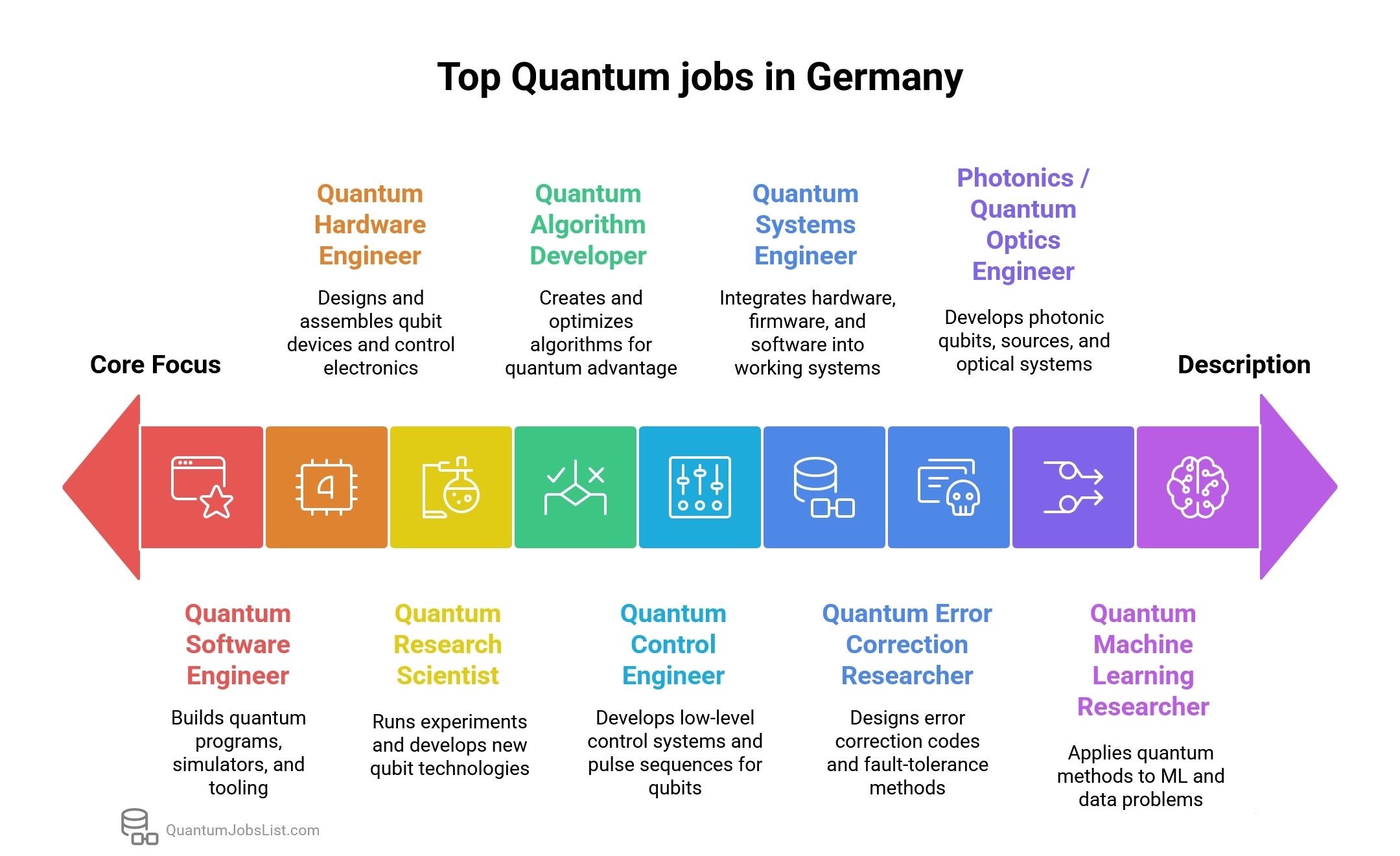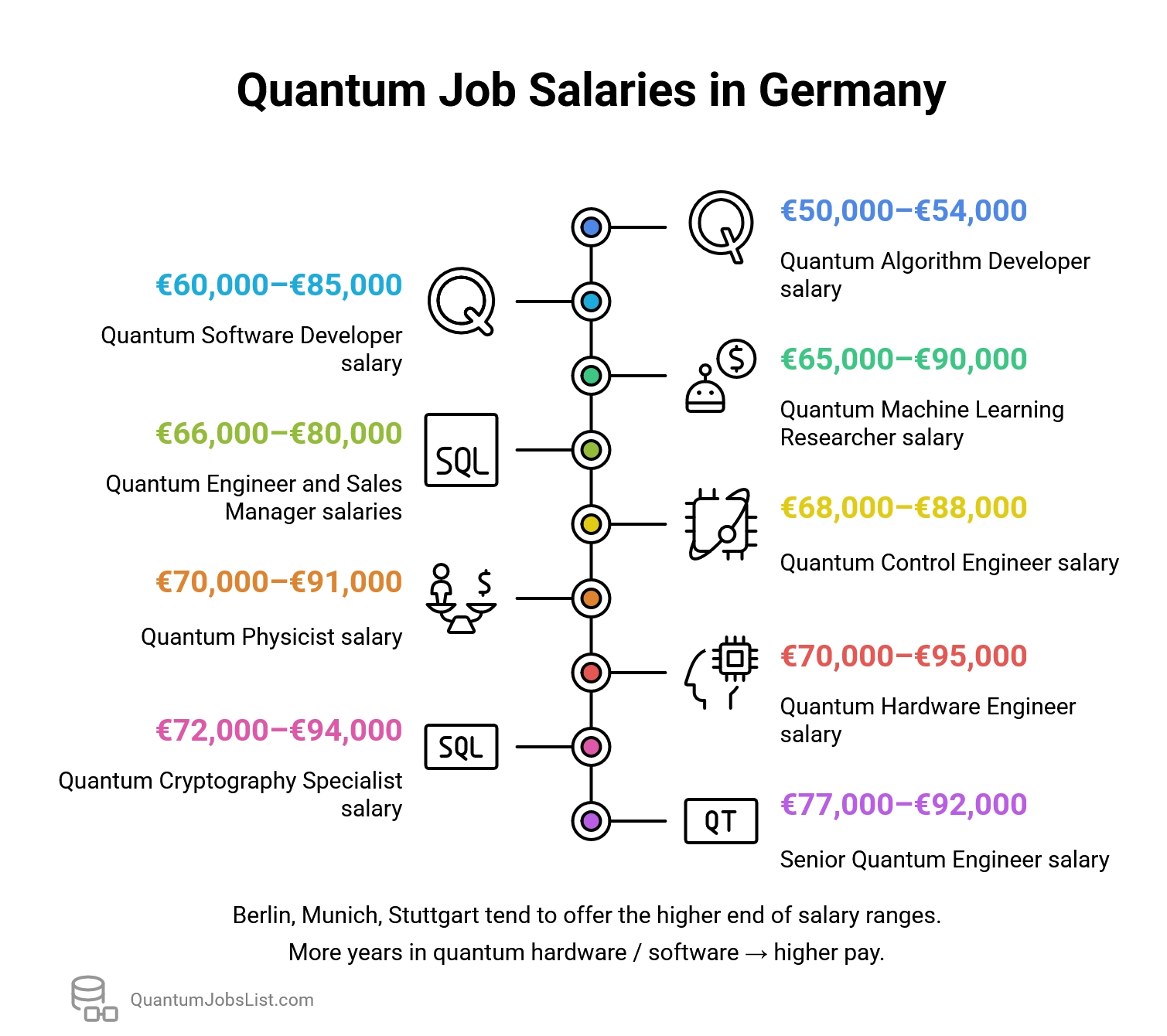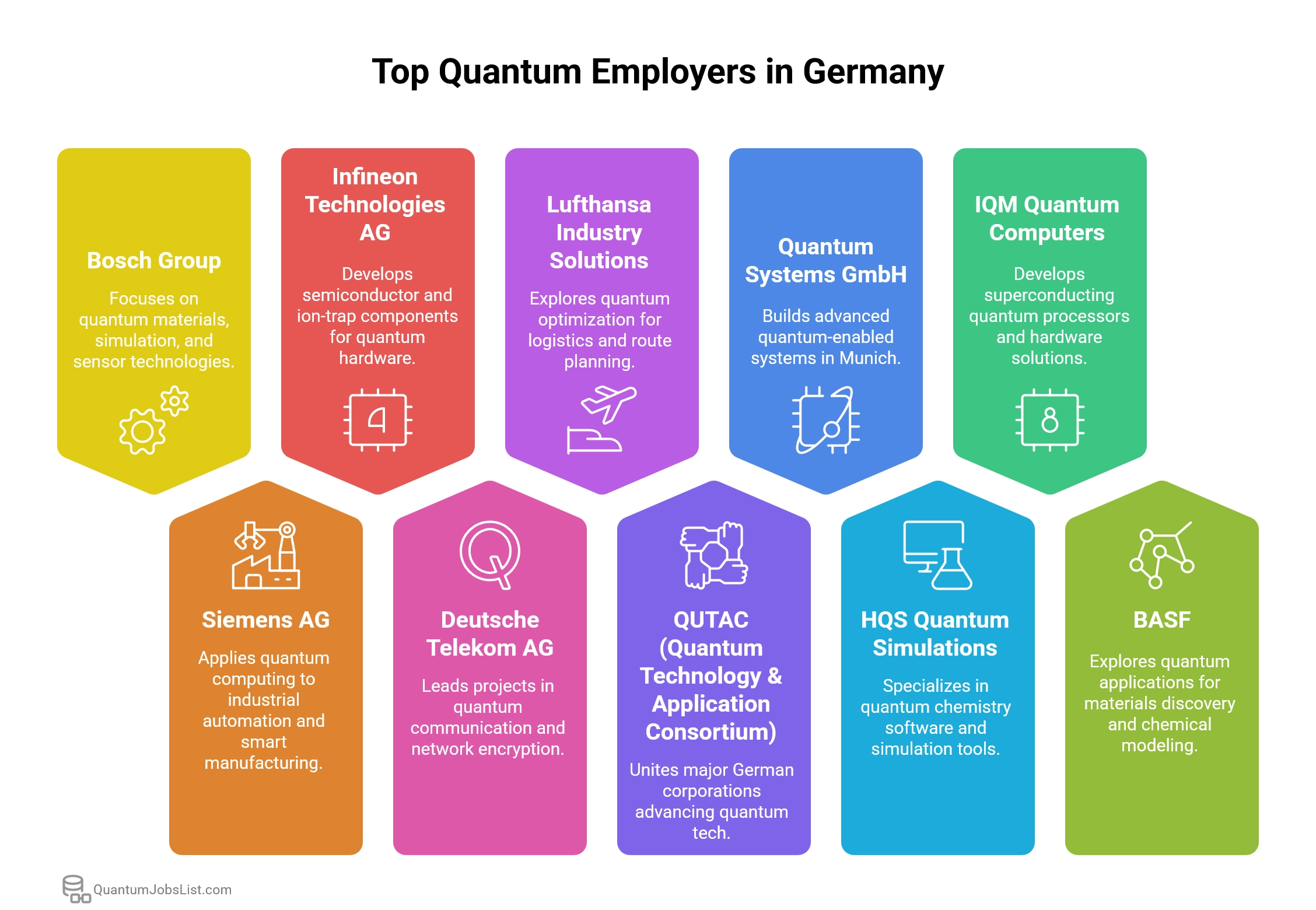Quantum Jobs List
Quantum Computing Jobs Germany
The quantum computing job market in Germany is expanding fast, offering roles in software, hardware, and research. Explore top employers, key skills, and salary trends shaping this growing field.
What Is Quantum Computing?
Using the concepts of superposition and entanglement in quantum computing helps solve problems, that classical computers find difficult to solve efficiently. The German government, which has invested over €3 billion in quantum technologies and established one of the most comprehensive quantum ecosystems in the world, has made Germany the leading quantum technology powerhouse in Europe.
Transformative technology of this kind improves cryptography, pharmaceuticals, automotive engineering, financial analytics, and climate change.
Our goal is clear: to be global leader in quantum technologies. Olaf Scholz, German Chancellor
Why Germany Leads in European Quantum Technology?
This quantum leadership is a result of excellent physics research paired with government and industry collaboration. The investment of €3 billion in the first universal quantum computer and the 2026 goal have put Germany on the global quantum computing map alongside the US and China.
The German Federal Quantum Technologies Action Plan sets aside about €2.2 billion for quantum information science and technology, of which Germany alone is contributing more than 60 percent. Such exceptional investment, alongside world-class research and a thriving startup ecosystem in Germany, has made it Europe's first quantum destination, attracting talent from all over the world.

Job Market Outlook in Germany
Germany’s quantum industry is expanding quickly. It is supported by over €2 billion in federal funding through the national quantum initiative. The country hosts more than 80 research groups and startups working on amazing quantum technologies. Cities like Munich, Berlin, and Stuttgart lead in job creation.
Growth Projections
- Current Situation: At present, Germany has between 87 and 100 active positions in quantum computing, which spans numerous specialized companies and research institutions
- Rapid Growth: Germany has 68 quantum computing startups, 18 of which are funded, and 5 hold Series A+ funding.
- European Leading Role: Germany's quantum sector is driven by investments from the federal government, the fastest-growing in the European Union.
- Job Market Opportunity: Germany has a 3:1 ratio of jobs to qualified candidates, meaning the world’s average applies here, and great opportunities await competent people.
Industry Demand
Employment opportunities span multiple sectors:
- Quantum Hardware Companies: Universal Quantum Deutschland and the other 4 companies are to build prototype quantum computers in the next 4 years.
- Research Institutions: The Max Planck Institutes and the Fraunhofer Society are looking for researchers and engineers for the DLR quantum computing initiative.
- Applied Quantum Technology: The QUTAC consortium is a collaboration of numerous top-tier German firms in the automotive, finance, telecommunications, and chemicals industries for the advancement of quantum technology.
- Startups: There are more than 68 quantum start-ups, including PlanQC, Kipu Quantum, HQS Quantum Simulations, and Pixel Photonics.
Federal Investment and Support
- Germany’s Spending Commitment: Germany dedicated €2 billion to “quantum computing and associated technologies.” The Ministry of Education and Research pledged €1.1 billion for R&D to be spent by 2025, and the Ministry of the Economy pledged €878 million for developing applications.
- DLR Quantum Computing Initiative: The German Aerospace Center was given five contracts on ion-trap-based quantum computing, and the Ministry of the Economy and Climate Action funded contracts worth €740 million.
- International Cooperation: A Joint Cooperation Statement on Quantum Information Science and Technology was signed in May 2024 by the United States and Germany.
- Ecosystem Development: The funding aimed to build a successful ecosystem of quantum technology startups and small to medium-sized businesses.
Academic Pipeline
Germany's quantum education infrastructure is among the world's best:
- Leading Programs: Over 15+ universities provide quantum computing programs, including 3 Bachelor’s and 17 Master’s programs offered in English.
- Research Excellence: Germany has invested in quantum computing research for many years, in addition to having research universities of the highest global standards.
- Industry Collaboration: The close working relationships among universities, research institutes, and businesses promote the speedy transfer of knowledge and technology.
- Talent Availability: The global employment market for graduates in this field is exceedingly favorable, with 3 open positions for every qualified applicant.
Quantum Computing Jobs Germany: Salary Ranges by Role
The salary data shows that jobs in Germany’s quantum computing industry pay well and require special skills. The demand for this profession and the related roles means the industry offers competitive salaries across Europe. Engineers earn about €102,385 a year, which is roughly €49 per hour. You can learn more about Quantum jobs salaries here.
Not to mention, Germany’s quantum computing salaries show comprehensive social benefits, a commendable work-life balance, and a relatively affordable cost of living compared to large US technology hubs.
Average Salary Overview
Overall Average: €102,385 a year across quantum computing engineering roles.

Geographic Salary Variations
Highest Paying Cities are Hamburg, Munich, and Berlin:
- Hamburg: +3-7% above national average
- Munich, Bavaria: +5-10% above national average
- Berlin: National average (offset by lower cost of living)
- Stuttgart, Baden-Württemberg:- +3-7% above national average
- Dresden, Saxony: Slightly below average but significantly lower living costs
European Context
German quantum salaries are competitive within Europe. These are typically 15-25% lower than US equivalents but with:
- Universal healthcare (no out-of-pocket premiums)
- Excellent work-life balance (35-40 hour weeks standard)
- 25-30 days annual vacation (vs 10-15 in US);
- Strong worker protections and job security;
- Lower cost of living than major US tech hubs
Salary data compiled from Economic Research Institute surveys, job posting analysis, and industry reports.
Additional Compensation
- Equity/Stock Options: Standard for well-funded startups (0.1% - 1.5% typical).
- Research Bonuses: Academic positions include publication and grant bonuses.
- Social Benefits: Public health insurance, 25-30 vacation days, and a pension.
- Professional Development: Courses and certifications, and conference attendance are company-funded.
- Relocation Support: Many companies offer international hires relocation packages ( €3,000-10,000).
What Skills and Degrees Are Needed for Quantum Jobs in Germany?
Most quantum jobs in Germany need a master’s or PhD in physics, computer science, or engineering. Skills in quantum mechanics, programming and tools like Qiskit or Cirq are vital. Moreover knowledge of AI and quantum hardware adds a strong advantage.
Educational Requirements
Minimum Qualifications: Bachelor's degree in Physics, Computer Science, Electrical Engineering, Mathematics or related field; Strong foundation in quantum mechanics, linear algebra and programming
Preferred Qualifications:
- Publications in quantum computing, quantum information or related fields
- Master's degree or PhD for research, algorithm development & hardware engineering roles
- Postdoctoral experience for senior research positions at Max Planck Institutes and universities
What Are the Top German Universities with Leading Quantum Programs?
Bavaria (Bayern)
Technical University of Munich (TUM): Offers a Master's in Quantum Science & Technology jointly with Ludwig-Maximilians-Universität München (LMU) with three areas of specialization: Experimental Quantum Science & Technology, Theoretical Quantum Science & Technology, and Quantum Computing.
- Part of Munich Center for Quantum Science & Technology (MCQST) Excellence Cluster
- Strong industry connections with Munich quantum ecosystem
Ludwig-Maximilians-Universität München (LMU): Joint Master's program in Quantum Science & Technology with TUM.
- Excellence in quantum optics and quantum information theory
- Access to Max Planck Institute of Quantum Optics facilities
Deggendorf Institute of Technology (DIT): Offers a Master's in High-Performance Computing/Quantum Computing. One of the first Universities in Germany to offer a degree in quantum computing.
- Practical industry-oriented approach
- Strong focus on HPC-quantum integration
University of Erlangen-Nuremberg: Quantum technology research in physics and materials science. University focus on quantum materials and solid-state systems
Hesse
TU Darmstadt: Quantum Computing Group in the Fachbereich Informatik (Department of Computer Science).
- Strong software & algorithms focus
- Excellent computer science integration
Goethe University Frankfurt: Quantum field theory and quantum information, Focus is theoretical physics strengths.
Baden-Württemberg
University of Stuttgart: Quantum computing and quantum sensing research.
- Part of Baden-Württemberg Quantum Computing Competence Center
- Strong photonics & quantum optics programs
Karlsruhe Institute of Technology (KIT): Quantum information and quantum materials.
- Excellent nanofabrication facilities
- Strong industry partnerships
University of Ulm: Hosts the DLR Quantum Computing Initiative (QCI) Innovation Center with XeedQ and other quantum companies.
- Focus on diamond-based quantum computing (NV centers)
- Direct access to cutting-edge quantum facilities
Berlin-Brandenburg
Freie Universität Berlin: Jens Eisert, Quantum Physics professor, is recognized for his research in quantum information science as well as quantum many-body theory.
- Strong theoretical quantum computing program
- IRIS Adlershof research campus
Humboldt-Universität zu Berlin: Quantum physics and quantum optics, Historical physics department
Technical University of Berlin: Quantum engineering and quantum communication, Quantum Industry-focused programs.
North Rhine-Westphalia
RWTH Aachen University: Quantum information science and quantum engineering.
- Strong connections to Forschungszentrum Jülich
- Excellent engineering integration
University of Cologne: Has a dedicated research group working on the integration and development of quantum computing hardware as well as the foundational principles of the tech.
University of Siegen: Home to eleQtron, trapped-ion quantum computing, have Strong startup ecosystem.

What are the Top Skills for Quantum Careers in Germany?
Technical Skills
To get a quantum computing job in Germany, you must have some technical skills focused on combining advanced science knowledge with strong computational and problem solving abilities.
- Fundamentals of Quantum Mechanics: Advanced proficiency in quantum states, operators, and measurement theory.
- Mathematics and Linear Algebra: Specializing in Hilbert spaces, tensor calculus, group theory, and complex analysis.
- Quantum Computing Algorithms: Proficient in VQE, QAOA, Shor's, and Grover's algorithms, and quantum machine learning.
- Classical Computing: Solid grounding in algorithms and complexity theory, and high-performance computing.
Hardware & Systems
Hardware and systems skills for quantum jobs in Germany focus on understanding quantum devices, experimental setups and system-level integration. These all are required for a reliable performance.
- Cryogenic and Ultra-low Temperature Systems: Familiar with dilution refrigerators and ultra-low temperature systems.
- Quantum Hardware Systems: Familiarity with trapped ion systems, superconducting qubits, NV centers, photonic systems, and neutral atom systems.
- Quantum Fault Tolerance: Understanding of quantum error correction codes and fault-tolerant quantum computing, and noise mitigation.
Professional Skills
Applied skills for jobs involve: Theory in real-world projects, testing solutions & improving quantum technologies through hands-on experience.
- German Language Skills (Merit): Even though many positions operate in English, proficiency in German (B1-B2 level) opens more opportunities. Particularly in everyday German-speaking environments and in industry roles.
- Interdisciplinary Teamwork: Ability to collaborate with and integrate teams of physicists, engineers, chemists, and computer scientists.
In-Demand Specializations
- Quantum Machine Learning: Integration with strong AI sector of Germany.
- Trapped-Ion Systems: Germany's primary quantum hardware focus through DLR initiative.
- Quantum Chemistry & Materials: Applications in automotive & chemical industries (BASF, BMW, Bosch).
- Quantum Cryptography: Post-quantum security for telecommunications and finance.
- Quantum Optimization: Logistics, supply chain and manufacturing applications.
What Companies Hiring for Quantum Computing Jobs in Germany?
Top quantum employers in Germany include: IQM Quantum Computers in Munich, Kipu Quantum in Karlsruhe and Berlin, and XeedQ GmbH in Ulm. Research roles are also available at Fraunhofer Institutes, DLR and IBM’s Quantum Hub in Ehningen.
Major Quantum Employers
Quantum Hardware & Full-Stack Systems
IQM Quantum Computers (Munich Office): More than 300 employees over 5 locations.
- Building superconducting quantum computers
- Focus on the European quantum ecosystem.
- Finnish company with major operations in Germany
- Recruiting in hardware, software, and applications
- Hiring across hardware, software, and applications teams
- Strong focus on the European quantum ecosystem
eleQtron (Siegen & Hamburg): Established in 2020, the company expanded to 75 employees and €50 million in order volume.
- Develops trapped-ion quantum computers based on MAGIC technology.
- Served quantum computers to DLR and Forschungszentrum Jülich.
- Strong growth with major government contracts.
planqc (Garching/Munich): First startup to emerge from Munich Quantum Valley and opened Garching headquarters in 2024.
- Develops laser-based quantum computers with neutral atoms as qubits and has secured $59 million to date.
- Provides complete quantum solutions from hardware to algorithms.
- Hiring experimental physicists, engineers, and software experts.
XeedQ (Ulm): Received €30 million funding from the Quantum Computing Initiative for the construction of a scalable diamond spin-based quantum computer.
- Situated in the DLR Quantum Computing Initiative Innovation Center.
- Exploiting the Diamond Nitrogen-Vacancy Center Defect.
- Access to advanced clean-room nanofabrication.
Parity Quantum Computing Germany (Munich): Designs blueprints and operating systems for quantum computers and collaborates with global hardware partners.
- Involved in DLR ion trap quantum computing initiative.
- Working on quantum systems architecture and its optimization.
Quantum Software & Applications
Avanetix (Berlin): Established in 2019, utilizes a hybrid of classical optimization and machine learning alongside quantum computing to tackle supply chain problems.
- The focus on the industry is strong.
- Quantum practical applications.
HQS Quantum Simulations (Karlsruhe): Constructs quantum algorithms for predicting molecular attributes for the materials, chemicals, and pharmaceuticals industries.
- Simulations are available through the cloud.
- Have strong partnerships with companies in the chemicals & pharmaceutical industries.
Kipu Quantum (Karlsruhe): Developer of quantum computing software for solving optimization problems, including cloud-enabled quantum computers.
- Concentration on optimization for industries.
- Near-term quantum device algorithm creation.
Quantum Components & Enabling Technologies
QUDORA Technologies (Braunschweig): Working on 50 qubit prototype quantum computer on a chip as a DLR initiative.
- Ion-tract quantum computing hardware
- Federal government development funding
Quantum Diamonds (Stuttgart): Quantum sensor development
- NV center technologies and their implementation
- Mechatronics in automation and control engineering
Pixel Photonics (Stuttgart/Garching): One of the leading quantum computing startups in Germany.
- Photonic quantum technologies
- Manufacturing of quantum technology components
Research Institutions & National Labs
Forschungszentrum Jülich: Large research center with quantum computing initiatives and PhD opportunities in superconducting quantum circuits.
- Part of Germany's supercomputing infrastructure
- Quantum-HPC integration research
Physikalisch-Technische Bundesanstalt (PTB) (Braunschweig): Joint work with NIST on optical atomic clocks and ultra-stable lasers.
- Quantum metrology and standards.
- Precision measuring instruments.
Max Planck Institutes: Several institutes with quantum initiatives.
- IMPRS-QST offers a PhD program encompassing atomic physics, quantum optics, and quantum information theory.
- Max Planck Institute of Quantum Optics (Garching).
Fraunhofer Society: Numerous locations, including Freiburg and Dresden, are engaged in quantum computing and quantum sensor research.
- Applied research focus
- Industry partnership/collab opportunities
DLR (German Aerospace Center): Leading the Quantum Computing Initiative located within their Innovation Centers in Hamburg and Ulm.
- Quantum companies are located at their centers.
- Initiative budget of €740 million.

International Companies with German Quantum Teams
SAP (Garching bei München, Walldorf): Hiring for SCM Optimization & Quantum team for algorithm development.
- Enterprise quantum applications
- Supply chain optimization focus
Microsoft Germany (Munich, Hamburg):
- Offers Azure Quantum platform development
- Quantum algorithm research
IBM Germany (Ehningen, Munich, Hamburg):
- Quantum computing research & development
- Qiskit ecosystem support
Google Germany (Munich):
- Quantum AI research partnerships with German universities
- Partnership with MCQST
Amazon Web Services Germany (Frankfurt, Munich):
- Offers Amazon Braket quantum service
- Cloud quantum computing infrastructure
Consulting & Professional Services
KPMG Germany: Hiring Quantum Computing Specialists.
- Quantum strategy consulting
- Enterprise implementation support
Accenture Germany (Multiple cities):
- Quantum consulting services
- Industry-specific quantum solutions
McKinsey Germany (Multiple cities):
- Quantum strategy & transformation
- Technology assessment and roadmapping
Quantum Consortia and Initiatives
- QUTAC (Quantum Technology and Application Consortium): A quantum computing consortium to encourage the transition to large-scale implementation within industry and business.
- Munich Quantum Valley (MQV): Entrepreneurship center with components such as PlanQC, Qlibri, Munich Quantum Software Company, Peak Quantum, Qoro Quantum, Munich Quantum Instruments, Support for startup incubation and acceleration.
Best Cities for Quantum Computing Jobs in Germany
Top cities for quantum computing jobs in Germany include Munich, which is home to the Munich Quantum Valley and many leading labs. Berlin is strong in quantum software, a hub for startups, and research centers. Hamburg is growing fast in quantum hardware and mobility innovation, which is supported by national funding.
1. Munich (München), Bavaria
- Why Munich: As the home of Munich Quantum Valley and Munich Center for Quantum Sciences and Technology (MCQST), the greatest clustering of Quantum sector companies in Germany and even in Europe is in Munich.
- Top Employers: planqc, IQM, Parity QC, XeedQ, (Ulm nearby), BMW, SAP, Google, kiutra, and a number of startups.
- Academic Hub: TUM, LMU, Max Planck Institute of Quantum Optics.
- Ecosystem: Europe’s finest customer-oriented research infrastructure, research-active venture capital, and global environment are key Germany/EU market drivers.
- Cost of Living: High (on par with European capitals), but great quality of life.
- Average Salary Premium: + 5-10% nationally
- Language: German for everyday life, but English will be dominant in the tech environment.
2. Hamburg
- Why Hamburg: eleQtron opened an additional Hamburg office with strong local experts, DLR Innovation Centre in Hamburg, hosting quantum companies.
- Top Employers: eleQtron, NXP Semiconductors Germany, Universität Hamburg, and IBM Germany offices.
- Academic Hub: Universität Hamburg with quantum computing research.
- Ecosystem: In the port city with a strong logistics sector requiring quantum optimization, there is an excellent quality of life.
- Cost of Living: High but lower than Munich, a beautiful waterfront city.
- Average Salary Premium: +3-7% nationally
- International Appeal: Cosmopolitan port city with a large expat community, and excellent quality of life.
3. Berlin
- Why Berlin: Europe’s startup capital with a developing quantum ecosystem and affordable living costs.
- Top Employers: Avanetix, a number of quantum startups, and Freie and Humboldt universities.
- Academic Hub: Freie Universität Berlin, TU Berlin , Humboldt-Universität and IRIS Adlershof research park.
- Ecosystem: Startup scene and culture, international demographics and strong VC presence.
- Cost of Living: Moderate. Moving up quickly, but still lower than Munich and Hamburg.
- Average Salary: National average
- Language: High internationalization, with English proficiency in the field of technology and science.
4. Stuttgart & Baden-Württemberg Region
- Why Stuttgart: High industrial quantum applications with a focus on the automotive industry.
- Top Employers: Stuttgart University, Bosch, and large automotive companies, Quantum Diamonds, and Pixel Photonics.
- Academic Hub: University of Stuttgart, and the nearby Karlsruhe Institute of Technology (KIT).
- Ecosystem: Hub of German automotive engineering, strong industrial R&D, and excellent infrastructure.
- Cost of Living: Moderate to high with excellent quality of life.
- Average Salary Premium: 3-7% above the national average.
- Industries: Automotive, aerospace, and advanced manufacturing.
5. Karlsruhe, Baden-Württemberg
- Why Karlsruhe: Home to HQS Quantum Simulations and Kipu Quantum, strong software focus.
- Top Employers: HQS Quantum Simulations, Kipu Quantum, KIT, research institutes.
- Academic Hub: Karlsruhe Institute of Technology (KIT), one of Germany's top technical universities.
- Ecosystem: Strong IT and software industry, affordable living, proximity to France and Switzerland.
- Cost of Living: Moderate, one of Germany's most livable cities.
- Average Salary: National average.
6. Ulm, Baden-Württemberg
- Why Ulm: Home to DLR Quantum Computing Initiative Innovation Center with XeedQ and multiple quantum companies.
- Top Employers: XeedQ, DLR QCI, University of Ulm.
- Academic Hub: University of Ulm with quantum research programs.
- Ecosystem: QCI is creating a unique ecosystem, nurturing quantum companies with access to advanced clean-room and nanofabrication facilities.
- Cost of Living: Moderate, smaller city with excellent infrastructure
- Average Salary: National average.
7. Frankfurt am Main, Hesse
- Why Frankfurt: The country's financial center with quantum finance opportunities.
- Top Employers: JoS Quantum, Goethe University Frankfurt, and banks.
- Academic Hub: Goethe University Frankfurt, TU Darmstadt (close by)
- Ecosystem: European financial center, concentrated efforts on quantum optimization, and cryptography.
- Cost of Living: High cost, international bank city.
- Average Salary Premium: +5-8% over the national average.
- Sectors: Finance, banking, insurance, consulting, and advisory.
How to Land a Quantum Job in Germany?
To get a job in quantum computing in Germany, you need a good background in physics, computer science or engineering. You should learn how to use tools like Qiskit, Cirq, and Python. It's better to get hands-on experience through research projects or internships. Try to participate in programs like Munich Quantum Valley or Fraunhofer's quantum labs to meet employers.
Step 1: Build Quantum Foundation
- Take classes on quantum theory, quantum information, and quantum algorithms.
- Continuing education (Master's or PhD) is required, since most German quantum positions need at least a Master's degree.
- Work with cross-platform quantum computing tools (Qiskit, PennyLane, Cirq, QuTiP).
- Look into German university curricula for direct access to the employment market and contact potential network.
Step 2: Gain Practical Experience
- Join quantum computing joint projects on GitHub.
- Join quantum hackathons and coding contests.
- Intern at German companies or research institutions focused on quantum.
- Write and submit studies or popular articles.
- Create quantum computing systems and develop a portfolio.
Step 3: Learn German (Recommended)
- Most jobs in the quantum sector require English in research and at start-ups.
- However, knowledge of German (B1-B2 level) lowers the importance of English, and German language knowledge opens up more German upper management positions and facilitates daily life and social integration. German skills increase the importance of English. Social German skills lower the importance of English in upper management positions.
- German language resources are available free at the Goethe Institute, Deutsche Welle, and university language courses.
Step 4: Network in the German Quantum Community
- Network in quantum conferences and workshops (MCQST, DPG meetings, and Munich Quantum Valley events).
- Join quantum language groups on LinkedIn in German.
- Contact and link with professionals and researchers in targeted companies.
- Attend university quantum seminars and workshops.
- Take part in quantum seminars and colloquia in universities.
Step 5: Understand Immigration Pathways (International Candidates)
EU Blue Card (Most Common for Quantum Jobs):-
- Minimum salary €71,700 for entry-level quantum engineers easily meets Blue Card threshold (€43,800 in 2024, lower for STEM);
- University degree required;
- Fast-track to permanent residence (21-33 months)
- Family reunification allowed;
- Path to German/EU citizenship after 8 years (6 with good German)
Skilled Immigration Act:-
- Recognized university degree
- Job offer from German employer
- Streamlined visa process
Recognition of Foreign Qualifications:-
- Most jobs in the quantum field require a recognized university qualification.
- You may obtain (Zeugnisbewertung) a Statement of Comparability for your non-EU degrees.
- DAAD database (anabin) lists recognized international universities.
Step 6: Apply Strategically
- Tailor CV/resume to German standards (photo optional, comprehensive format, 2-3 pages acceptable)
- Highlight quantum-related skills, publications, and projects.
- Provide language proficiency levels (CEFR: A1-C2 for German, English)
- Prepare for coding and technical interviews on quantum algorithms, hardware knowledge, and coding.
- Apply through company websites and Niche job boards such as Quantum Jobs List
Professional Development Resources
Professional development for quantum computing jobs in Germany includes: Online courses, university programs and industry workshops. These help professionals build practical skills and stay current with new quantum technologies.
Online Learning Platforms
IBM Quantum Learning:-
- Free Qiskit tutorials & documentation
- Hands-on quantum programming experience
Microsoft Learn:-
- Azure Quantum documentation & tutorials
- Q# programming language courses
Quantum Open Source Foundation:-
- Free quantum educational resources
- Mentorship programs connecting students with quantum professionals
Xanadu Quantum Codebook:-
- Free interactive quantum computing tutorials
- Focus on PennyLane and quantum machine learning
Udemy and edX:-
- Complete Quantum Computing courses
- European quantum technology programs.
- MIT Quantum Computing courses
- Quantum Computing courses from TUM, RWTH Aachen, and international universities.
Professional Certifications
German Academic Certificates:
- Various German universities such as TUM, offer quantum computing certificates and continuing education programs
- Max Planck Schools offer structured PhD training programs
Industry Certifications:
- IBM Certified Associate Developer certificate for Quantum Computation by using Qiskit.
- AWS Quantum Solutions Architect certificate for the Amazon's Braket.
- Microsoft Azure Quantum Developer Certification to learn basics of quantum development.
Quantum Books & Publications
- "Quantum Computing: An Applied Approach", by Jack Hidary
- "Programming Quantum Computers", by Johnston, Harrigan & Gimeno-Segovia
- "Quantum Computation and Quantum Information", by Nielsen & Chuang (Advanced Level).
- German quantum research publications on arXiv;
- DPG (German Physical Society) publications
Career Guidance via Quantum Jobs List
Quantum Jobs List helps students and professionals see career paths in Germany’s growing quantum ambition. The platform connects users with job openings, and learning resources. For more, You can have a look at our Blog.
NEW Quantum Jobs Germany
For More, Please visit Quantum Jobs in germany
FAQs
Here are a few common questions people ask about quantum careers in Germany. These are covering topics like needed skills, education paths, top employers and future growth.
What is the average salary for quantum computing jobs in Germany?
In Germany, quantum engineers have an annual compensation of €100,000. The entry-level positions start around €65,000 per year, while highly skilled and seasoned workers in the field take home €150,000 or even more. The highest salaries are in Munich and Stuttgart. Most jobs in this field also offer extra benefits, like healthcare, sick leave, and retirement plans.
Suggested Read: Quantum Computing Jobs and Salaries
Do I need to speak German to work in quantum computing in Germany?
Not really. The majority of quantum startups and research teams in Munich, Berlin, and Hamburg mostly work in English. Knowing German is useful for personal networking, for progress in the field, and working for bigger companies such as Siemens or Bosch. Most companies in Germany provide their employees with German classes free of charge.
Do I need a PhD to work in quantum computing in Germany?
Some jobs in quantum software and hardware engineering will hire people with a Master's degree, but not all of them. Many of these jobs still focus on hands-on experience, like quantum programming, lab work, or solving real-world problems. For some engineering positions, formal qualifications may be of secondary importance. You can learn more at How to Get Quantum Jobs Without a PhD.
Which German city is best for quantum computing jobs?
Munich highlights Germany's quantum technology sector, featuring companies such as PlanQc, IQM, and the Munich Quantum Valley. Berlin and Hamburg have growing ecosystems with startups and research labs. Karlsruhe, Stuttgart, and Ulm also offer roles in hardware, simulation, and quantum networking, supported by strong regional institutions.
Can international candidates get quantum computing jobs in Germany?
Germany actively hires international quantum experts under the EU Blue Card program, offering quick residence and relocation support. Qualified STEM professionals earning above €71,700 get automatic sponsorship, which is quicker than most EU destinations. Many companies also assist with relocation, housing, and settling into Germany.
What industries are hiring quantum professionals in Germany?
Quantum employment in Germany spans multiple sectors including: automotive (BMW, Volkswagen), chemicals (BASF), telecommunications (Deutsche Telekom), finance, aerospace (DLR) and energy. These businesses use quantum tech for optimization, encryption, and materials science. QUTAC consortium promotes quantum tech for industrial use in multiple industries.
What programming languages should I learn for quantum jobs in Germany?
Most important is Python, mostly with Qiskit, Cirq, and PennyLane. C++ is vital for hardware development and low-level programming, while MATLAB and Julia assist with research. Understanding Q#, as well as knowledge of Git and Linux, increases chances of employment, as most companies operate internationally mandated coding practices.
Are there entry-level quantum computing jobs in Germany?
Yes, but they’re competitive. Junior Quantum Engineer, Research Assistant, and Quantum Software Developer are examples of entry-level positions. Graduates of German universities like TUM, KIT, and RWTH Aachen get a plus. A decent GitHub profile, participation in hackathons centered on quantum tech, and relevant internships enhance chances.
Start Your Quantum Computing Career in Germany Today
Germany's growing quantum computing ecosystem is a great place for professionals at every level. Germany offers excellent opportunities for a career in quantum computing. This country has the largest funding for quantum computing in Europe, with 3 billion euros invested. There are over 68 quantum startups & top research institutions. Different industries in Germany, such as automotive, chemicals, finance, and manufacturing, are already using quantum computing.
The skills gap in the industry is so large that each qualified candidate will not only stand out but also receive lucrative job offers and work on impactful projects. Germany's quantum computing sector is available to you whether you are a new graduate, a skilled tech worker looking to pivot your career, or an overseas worker trying to find opportunities in Europe.
The contracts worth €208 million going to companies in Germany are giving a massive boost to quantum computing. Anna Christmann, Federal Government Commissioner for the Digital Economy and Start-ups.
Next Steps
- Find Latest Jobs: Check out Germany-based job opportunities in quantum computing at 'Quantum Jobs List'.
- Evaluate the Skills: Assess your existing skills in comparison with what is needed for the job and figure out missing components.
- Network: Reach out to quantum specialists in Germany on LinkedIn and participate in conferences or meetings, virtually or in person.
- Learn German: Even a minimum knowledge of the language(A2-B1 level) significantly increases your opportunities.
- Advance: Take courses on quantum computing and join open-source projects.
- Apply Strategically: Target positions matching your background and career goals.
🍁Quantum Interest Form
The quantum computing job market in the Germany is booming. Whether you are job hunting or just quantum-lover, we do love to hear from you and share your story on social media e.g. Twitter.





.webp)

.webp)

.svg)

